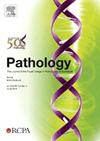The effect of Proteinase K treatment on GeoMx digital spatial profiling data quality from formalin-fixed, paraffin-embedded tissue
IF 3.6
3区 医学
Q1 PATHOLOGY
引用次数: 0
Abstract
The emergence of spatial profiling technologies in recent years has accelerated opportunities to profile in detail the molecular attributes of a wide range of tissue pathologies using archival specimens. However, tissue treatment for fixation and storage does not always support generation of high-quality genomic data. The purpose of this study was to investigate the impacts of Proteinase K (ProtK) treatment, as a way to increase target transcript exposure, on downstream sequencing data quality metrics for spatial transcriptomic data using formalin-fixed, paraffin-embedded samples. In a series of four independent assessments using different tissue types (nasal mucosa, tonsil, pancreas), varying concentrations of ProtK (ranging from 0.1 to 1 μg/mL) were used as part of the sample processing workflow to generate transcriptomic data using the Nanostring GeoMx DSP and Illumina NextSeq 2000 platforms. Use of higher concentrations of ProtK was generally found to increase total reads (2–4-fold). However, negative probe counts also tended to be increased (2–12-fold), resulting in reductions in the signal-to-noise ratio (10–70% lower) and the number of genes detected above background (50–80% lower). These effects were not seen in all tissues and impacts of tissue handling and processing, beyond ProtK treatment, on data quality metrics, also require consideration. Regardless, these observations highlight the need for careful consideration of a range of sample processing factors and benefits that may be achieved through the optimisation of sample processing workflows for specific tissues as a way to maximise the generation of quality data using spatial transcriptomic approaches.
蛋白酶 K 处理对来自福尔马林固定、石蜡包埋组织的 GeoMx 数字空间剖析数据质量的影响。
近年来,空间剖析技术的出现加快了利用档案标本详细剖析各种组织病变的分子属性的机会。然而,组织的固定和储存处理并不总是支持生成高质量的基因组数据。本研究的目的是调查蛋白酶 K(ProtK)处理对使用福尔马林固定、石蜡包埋样本的空间转录组数据下游测序数据质量指标的影响。在使用不同组织类型(鼻粘膜、扁桃体、胰腺)进行的一系列四项独立评估中,不同浓度的 ProtK(0.1 至 1 μg/mL)被用作样本处理工作流程的一部分,使用 Nanostring GeoMx DSP 和 Illumina NextSeq 2000 平台生成转录组数据。使用较高浓度的 ProtK 通常会增加总读数(2-4 倍)。然而,负探针计数也有增加的趋势(2-12 倍),导致信噪比降低(降低 10-70%)和检测到的高于背景的基因数量减少(降低 50-80%)。这些影响并不是在所有组织中都能看到,除了 ProtK 处理之外,组织处理和加工对数据质量指标的影响也需要考虑。无论如何,这些观察结果都强调了仔细考虑一系列样本处理因素的必要性,以及通过优化特定组织的样本处理工作流程来最大限度地利用空间转录组方法生成高质量数据的好处。
本文章由计算机程序翻译,如有差异,请以英文原文为准。
求助全文
约1分钟内获得全文
求助全文
来源期刊

Pathology
医学-病理学
CiteScore
6.50
自引率
2.20%
发文量
459
审稿时长
54 days
期刊介绍:
Published by Elsevier from 2016
Pathology is the official journal of the Royal College of Pathologists of Australasia (RCPA). It is committed to publishing peer-reviewed, original articles related to the science of pathology in its broadest sense, including anatomical pathology, chemical pathology and biochemistry, cytopathology, experimental pathology, forensic pathology and morbid anatomy, genetics, haematology, immunology and immunopathology, microbiology and molecular pathology.
 求助内容:
求助内容: 应助结果提醒方式:
应助结果提醒方式:


